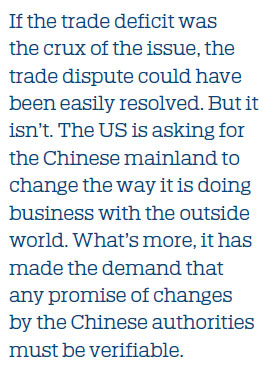Some glimmers of hope amid uncertain economic outlook
Updated: 2019-01-16 07:28
(HK Edition)
|
|||||||
Signs of progress in the trade talks between the United States and the Chinese mainland have boosted Hong Kong investors' confidence, pushing the benchmark up last week.
Many investors and stock analysts are banking on the presumption that the just concluded first round of the face-to-face talks between the two sides will lead to an understanding that could avert further escalation of the trade war. Their confidence was further fueled by US President Donald Trump's optimistic tweets.
Before jumping back into the market or making business expansion plans for 2019, it pays to bear in mind that the core issues of the dispute involving calls for structural changes in the Chinese mainland's economic management and business ways have barely been touched on.
To be sure, Beijing has taken concrete move in increasing its import of some US agricultural produce and made promises of bigger purchases in future. But it is important to note that the trade deficit is more an excuse than a real concern of Washington in starting the trade war.

Indeed, the US overall trade deficit is of comparatively little consequence to the large US economy that is driven mainly by domestic demand. It is often argued that imports from the Chinese mainland and other economies, notably Japan and Germany, are the main reason for job losses in the US industrial heartland. However, numerous studies have come up with little proof of a direct correlation between imports and the loss of jobs.
Some notable economists contended that it was the rapid advance in automation rather than imports that has made many factory workers in auto and some other industries redundant. They predicted that the maturity of the artificial intelligence technology will cause even greater disruption in the job market when machines are replacing humans in many jobs not only in manufacturing but numerous other economic sectors.
If the trade deficit was the crux of the issue, the trade dispute could have been easily resolved. But it isn't. The US is asking for the Chinese mainland to change the way it is doing business with the outside world. What's more, it has made the demand that any promise of changes by the Chinese authorities must be verifiable. Such a demand may touch on sovereignty issues which leave little room for compromise.
Meanwhile, the countdown to the end of the 90-day truce agreed in December 2018 is ticking. If Trump makes good his tariff threat when an agreement cannot be reached then, you can expect global investment markets, particularly the ones in Hong Kong and on the Chinese mainland, will tank.
For now, all eyes are on the outcome of the higher-level talks between the US and the Chinese mainland in Washington later this month. A major breakthrough or a complete breakdown in the talks seems unlikely. The best outcome investors and economic planners in Hong Kong can hope for is sufficient progress is made to convince Trump to extend the deadline of the truce by another 90 days.
There are incentives for Trump to do so. He is widely seen to be using tariffs as a weapon to get his own way. But many economists have noted that the weapon when deployed can backfire by hurting US consumers by raising prices of a vast range of goods imported from the Chinese mainland.
It has become obvious to keen observers of the trade dispute that tariff is not a means in itself because the extra income going into the federal coffers is small compared to the total government budget. But rather, it is a bargaining chip which is more effective as a threat rather than an expended weapon with unpredictable impact on Chinese mainland manufacturers and US consumers.
There is every reason for Hong Kong investors to remain, to borrow a favorite expression from stock analysts, "cautiously optimistic" while keeping a close watch on the development of the trade talks.
And, of course, they can take comfort in the dovish turn of the US Federal Reserve in its interest rate policy. There is more in the life of an investor than the trade war.
The author is a veteran current affairs commentator.
(HK Edition 01/16/2019 page12)